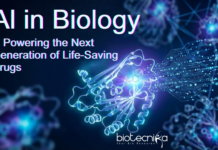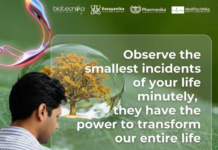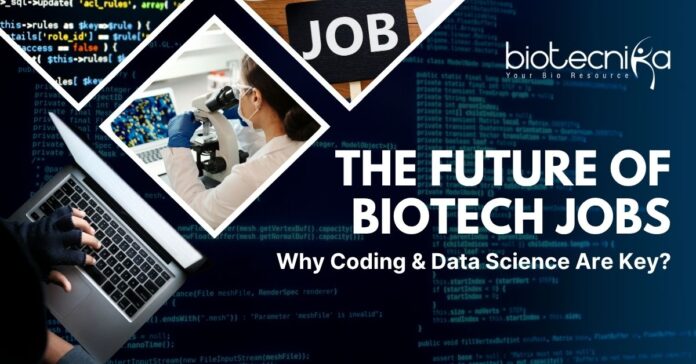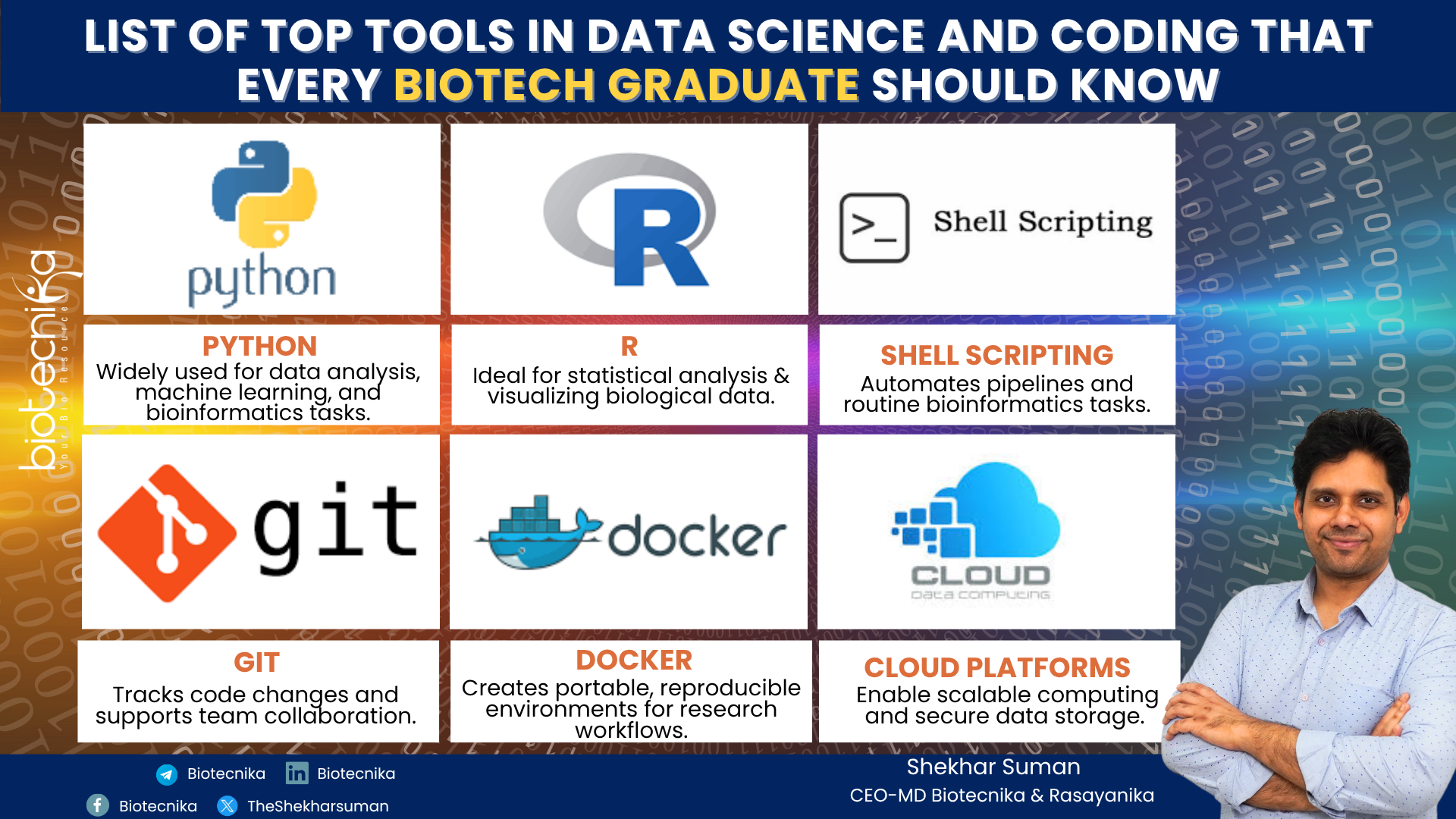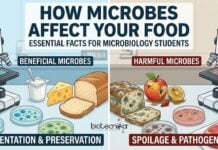The Future of Biotech Jobs: Why Coding & Data Science Are Key
“I’m a Life Science student, why do I need to learn coding?”
Like every other biotech and life science student, even Tara imagined a future filled with microscopes, petri dishes, and lab journals, with strains on her hands. She had never touched a line of code. She believed that computers belong to the IT department and have nothing to do with her and her field.
But that changed during her final year.
While working on a gene expression study, Tara found herself at a standstill. She had a massive dataset to analyse. It was too big for Excel and too messy for manual sorting. That’s when her mentor advised her to try Python. What started as a reluctant experiment turned out to be a revelation. In just a few weeks, she went from dreading code to using it to visualize patterns, automate analysis, and even spot errors no one else had noticed.
Today, Tara works at a biotech startup, where she designs personalized therapies. Well, her lab bench still has test tubes, but there is also a second screen with Jupyter Notebooks, gene databases, and dashboards powered by machine learning. She didn’t leave biology behind. She just gave it a powerful upgrade.
Tara’s story is not unique; it simply illustrates how the biotech world is quietly evolving today. The future isn’t just about biological experiments. It’s about biology plus code. And if you want to build a rewarding, future-proof career in this impactful field, understanding data science and programming may be just as crucial as understanding DNA.
In this article, we will explore why coding and data science are increasingly crucial in biotech, where they are no longer optional. And we will understand how you can prepare for the career revolution.
-
Table of Contents
Why Coding Matters in Biotech
As a Life science student, you must be wondering why data science and coding are essential to you, right? To help you understand the role of these in today’s modern biotech world, we have listed a few reasons why you should consider coding. Let’s look at them one by one:
-
Automating Experiments
Do you remember the famous quote, “Modern problems need modern solutions”? In today’s labs, researchers require automation to run protocols more efficiently and with fewer errors. Whether you are programming a liquid handler or setting up image analysis workflows, scripting is essential. Today, researchers worldwide use programming languages like Python to control laboratory instrumentation, collect data, and streamline experiments.
-
Building Bioinformatics Pipelines
From DNA sequences to RNA expression, the biological data needs cleaning, analysis, and visualization. These steps are controlled by using automated pipelines written in Python, R, or bash. Without coding, researchers would have to process these procedures manually. This would be slow and flawed.
-
Custom Analysis and Visualization
Often, commercial software has its limitations. Scientists often require custom plots, data filters, or specialized statistical tests. With coding, they can customize analysis tools based on the projects they are working on. This flexibility allows the scientists to unlock deeper insights and draw meaningful conclusions.
NEW LAUNCH – Biologists, learn coding with confidence—no background needed!
- 3, 6 & 12 months project work | 100% Placement Assistance | Work Experience
- Hands-on learning. Career-ready skills.
- Next Batch: 18th Sept, 2025
Info: https://btnk.org/Coding-for-biologist-project
Chat: https://btnk.org/whatsapp-coding
✅ Beginner-friendly | ✅ Tailored for biologists
-
Why is Data Science Important?
Now that you have understood the importance of coding in biotechnology, let’s talk about data science. Imagine a car, if coding is the engine, then data science is the driver, and that’s how the vehicle will move forward. Biotech isn’t just about generating data. It’s about understanding the field.
-
Understanding Complex Datasets in Biotech for The Future of Biotech Jobs
From genomics to proteomics, in today’s biotech world, we are creating huge datasets. Machine Learning and statistics help in identifying patterns, such as genes linked to disease, potential drug targets, or patient subgroups for personalized therapies.
-
Improving Clinical Trials
Data science enhances the clinical trials process by identifying which patients are most likely to respond to treatments. It also facilitates real-time monitoring of trial progress, leading to safer studies and more informed decision-making.
-
Precision Medicine
Have you ever considered a drug designed based on your genetic material? With the advancement of technology, healthcare is becoming more personalized. Data scientists in biotech analyze genomes, health records, and lifestyle data to predict which treatment will work best for each patient.
-
Smarter Manufacturing
Well, we all know that manufacturing is an integral part of the biotech industry. From temperature to product yield, sensors monitor every single thing. Data science helps in identifying problems early and keeps production efficient. With industrial AI, biotech manufacturing is growing like never before.
- What Biotech Companies Want for The Future of Biotech Jobs
The job market is changing quickly. Companies now want “hybrid” professionals: people who know biology and data science.
Key Job Titles
- Bioinformatics Scientist: Works on omics data with Python or R.
- Computational Biologist: Builds models to understand biological systems.
- Biotech Data Scientist: Applies ML tools to experiments and trials.
These roles combine lab skills with coding, analysis, and modeling. Employers look for flexible candidates and problem solvers, and not just for those who can code faster.
List of Top Tools in Data Science and Coding
- Python (with pandas, Biopython, scikit-learn, matplotlib)
- R (with ggplot2, tidyverse, DESeq2)
- Shell scripting for managing pipelines
- Git for version control
- Docker, AWS, and cloud platforms for scalable analysis
With the knowledge of these tools, you can stand out from the crowd in this competitive job market.
- You Don’t Need to Be a Programmer!
Many biologists worry that coding is too technical. But coding for biotech isn’t about building apps or websites; it’s about solving scientific problems. You already understand experimental design and data structure. Learning to script adds a layer of efficiency.
- Learn Through Projects
Instead of only watching videos, try small projects. Analyze a public dataset. You can analyse a FASTA file, calculate GC content, and make gene expression plots. Reproduce a study using your own code. These actual challenges build confidence and make great resume material. You can track your progress with Jupyter Notebooks and GitHub.
- Educational Shifts
As the biotech industry evolves, so do the skills students need to succeed in it. Traditional biology degrees are no longer enough. Today’s classrooms are adapting—merging biology with coding, statistics, and data science. Educational institutions around the world are redesigning their programs to prepare students for this new interdisciplinary future.
- Integrated Curriculum
Students learn to analyze RNA-seq results in R or write simple scripts to process experimental data. This approach helps prepare graduates for research jobs that require coding.
- Certifications and Short Courses
If you’re already in a degree or job, look into:
a. Bioinformatics bootcamps
b. Data science for biology courses
c. Specialized MOOCs
These short-term programs offer practical skills and networking opportunities.
- Where The Biotech Job Market is Headed?
As sequencing costs decrease and sensors become more sophisticated, biotech generates more data than ever. Companies need talent to manage and analyze it. This includes health tech startups, pharma firms, hospitals, agriculture tech companies, and even environmental agencies.
- Entry Paths
i. Internships in research labs, bioinformatics units, or clinical genomics teams
ii. Master’s programs in computational biology, data science, or bioinformatics
iii. Freelance work or open-source projects (build your GitHub portfolio)
A biology student with a few solid coding projects can quickly stand out in interviews.
- Better Pay & Flexibility
Hybrid roles often pay more than traditional wet-lab positions. They also allow you to move across sectors—from academic research to pharma to AI startups—without losing momentum.
- Real-World Applications
Biotech isn’t just about theory. It’s solving real problems across healthcare, agriculture, and the environment. Let’s explore how coding and data science are driving innovation in real-world biotech projects.
- Disease Surveillance
Teams tracking virus outbreaks rely on automated pipelines, mutation modeling, and dashboards, powered by code. Bioinformaticians play a frontline role here.
- Sustainable Agriculture
Biotech firms use gene-editing and environmental data to grow resilient crops. Data scientists help model plant behavior across regions and seasons.
- Drug Discovery with AI
Machine learning tools are now used to predict how molecules interact, cutting drug development costs. Scientists with Python and ML experience are central to these efforts.
- Wearables and Health Tech
From glucose monitors to fitness trackers, biosensors are experiencing a surge in demand. Biotech professionals analyze the data and design personalized interventions—again, using code.
-
Building Your Career: A Quick Roadmap for the Future of Biotech Jobs
Breaking into biotech today requires more than a degree. This section provides a practical, step-by-step guide to help you develop the essential skills, projects, and connections necessary for a successful biotech career.
-
Step-by-Step
- Learn Python or R (start small: data cleaning, plotting, basic stats)
- Work on real data (from NCBI, GTEx, ENCODE)
- Build a portfolio (GitHub projects, blog posts)
- Apply for biotech internships.
- Join a community (BioStars, Reddit Bioinformatics, LinkedIn groups)
- Keep learning (read papers, follow coding trends, practice)
Data Science Hands-on Internship for Biologists: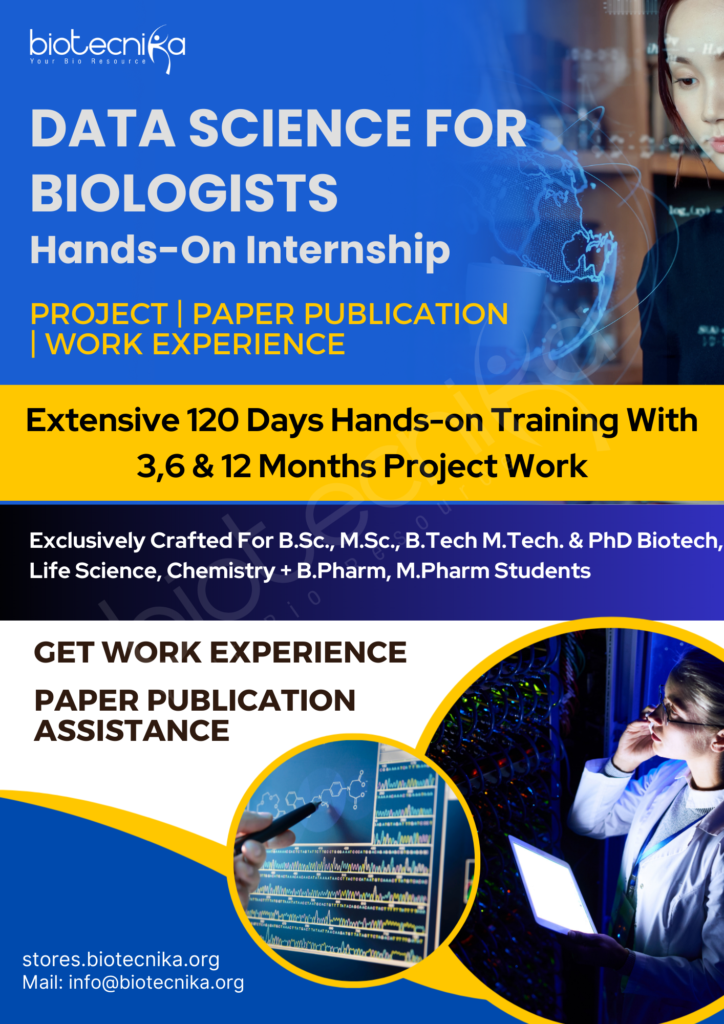
What will you get?
✔️3, 6 & 12 Months Project Work
✔️Publish Papers
✔️Placement Assistance
Want to Enrol? Click here
Starts: 30th Jan 2026
Key Tip
Don’t try to learn everything. Choose a niche – genomics, plant biology, microbiome, drug discovery, and go deep. Recruiters prefer specialists with a strong project record over generalists with no real-world experience.
The Next Five Years the Future of Biotech Jobs.
Biotech will continue blending science and computation. Here’s what’s coming:
- Multiomics jobs: Combining genomics, proteomics, and more
- Edge computing for biosensors: Real-time processing from wearables and remote sensors
- AI-first labs: Drug design and diagnostics powered by deep learning
- Biotech cloud platforms: Teams using cloud-based labs and modeling environments
The lines between biology, data science, and software are becoming increasingly blurred. The best biotech careers will go to those who can cross all three. Biotech is entering a golden era. But it’s not the same field it was a decade ago. The industry now demands professionals who have the ability to work with code and understand biological data.
If you are a graduate or young professional taking baby steps in the industry, don’t be afraid of coding. Start by asking questions, drafting simple scripts, and analysing messy data. You can build projects that will help you gain skills. Prepare yourself for a future where science and data work hand in hand. The biotech industry is hiring.
The biotech industry is hiring people who can experiment, analyze, and innovate. The future is digital, and it needs people like you to build it. The Future of Biotech Jobs is here.


